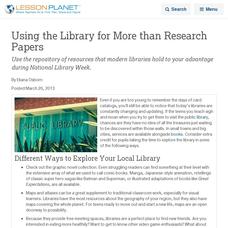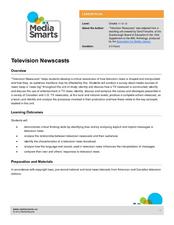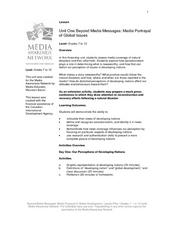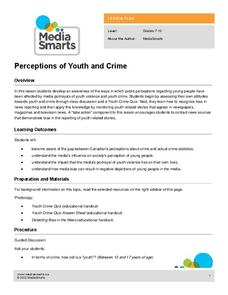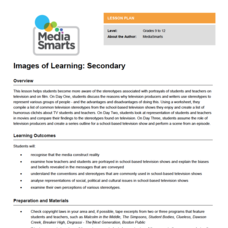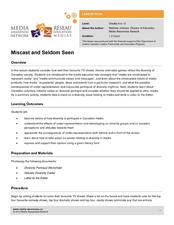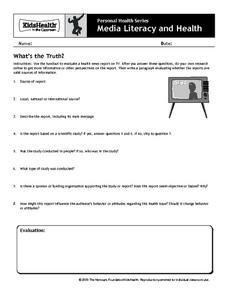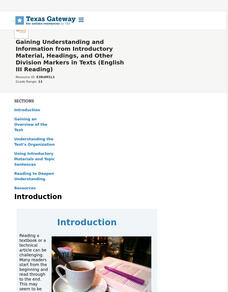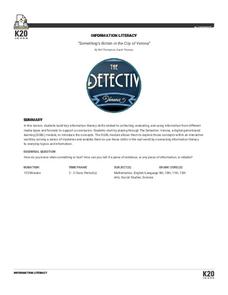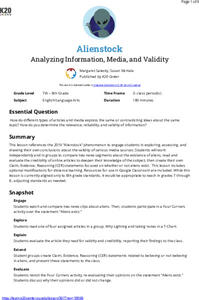Curated OER
Using the Library for More than Research Papers
Use the repository of resources that modern libraries hold to your advantage during National Library Week.
Curated OER
Scapegoating and Othering
Scapegoating and "Othering" is the focus of a series of activities that ask groups to consider how these behaviors contribute to hatred and intolerance. Groups are given a scenario and discussion questions based on the situation. Whether...
Curated OER
The Internet of Things: IoT
How has the Internet of Things affected our lives? Scholars examine the massive influence of mobile devices in this analysis activity, which begins with a seven-minute documentary clip. They also read a New York Times article (linked)...
Media Smarts
Bias in News Sources
As young consumers of media, it is important for high schoolers to explore concepts of bias and prejudice, and how they may be present in media. After discussing ideological messages that media can contain, individuals complete a warm-up...
Curated OER
Television Newscasts
When we watch news broadcasts on television, we receive a much more visual perspective than when we read the newspaper. How do sets, clothing, and music contribute to our understanding of the story? Compare American and Canadian news...
Curated OER
Beyond Media Messages: Media Portrayal of Global Issues
Take a close look at news reporting techniques and global issues. Begin by creating a graphic representation of developing nations and defining the term. After class discussion, the second day's activities pick up by deconstructing news...
Curated OER
Taming the Wild Wiki
Take a look at the credibility of online sources such as Wikipedia. Discussion points and handouts are included to facilitate a meaningful and informative dialogue. Tips are given on how to determine if a Wikipedia article is reliable...
Curated OER
Diversity in Media: Looking Critically at What We See
This learning experience fosters awareness of representations we see, and don't see, in the media. Learners list TV programs, games, and films they enjoy, identify characters' ethnic, religious, (dis)ability, and sexual orientation...
Media Smarts
Sex in Advertising
Converse with your class about the use of sex in advertising. Analyze the biological, emotional, and spiritual connections associated with sex, and how the media uses these affiliations to sell products. Take a closer look at...
Media Smarts
Perceptions of Youth and Crime
Explore the potential for bias in the news and in scholars' own attitudes and opinions. Begin with a quiz on youth crime to see how learners perceive crime among their peers. After looking at the correct answers, put individuals in...
Media Smarts
You Be the Editor
Look at different case studies to discuss the ethics of journalism. Twelve real-life events are written up and your learners get to be the editors. Encourage your class to think about the implications of publishing decisions. After each...
Media Smarts
Images of Learning: Secondary
Make your scholars more aware of stereotypical portrayals in film and television. Discuss the definition of "stereotypes" and how they are used to present a story. High schoolers look at specific television shows and complete a chart...
Curated OER
Miscast and Seldom Seen
Consider how well students' favorite TV shows, movies and video games reflect the diversity of society. The lesson introduces your class to several media literacy concepts, such as how media conveys values and messages, as well as the...
Nemours KidsHealth
Eating Disorders: Healthy Advertising
In this eating disorders worksheet, middle schoolers use drawings or photos from magazines to create an ad for blue jeans. They use realistic body types and positive messages about body image and types. The worksheet includes two...
Nemours KidsHealth
Media Literacy and Health: What’s the Truth?
In this personal health media literacy activity, students use the eight questions on this sheet to evaluate a health news report on television. Students write paragraphs the determine whether the reports are valid sources of information.
Texas Education Agency (TEA)
Gaining Understanding and Information from Introductory Material, Headings, and Other Division Markers in Texts (English III Reading)
All teachers are teachers of reading! The 13-part interactive series ends with a lesson that teaches learners (and their instructors) how to approach reading their textbooks. After learning about several strategies, users test their...
Texas Education Agency (TEA)
Drawing Conclusions Based on the Sufficiency and Strength of Research (English III Reading)
High school juniors learn how to construct a strong argument by crafting a claim and using neutral language backed by evidence from reliable sources. To do so, they learn to evaluate sources and evidence to support claims. They then...
Curated OER
Introduction to Abigail Adams
Remember this lady! Abigail Adams, the wife of John Adams, the second President of the United States, and the mother of the sixth president, John Quincy Adams, was much more than a wife and mother. This prolific letter writer is the...
PBS
Amid Rising Economic Inequality, Does America Need a Third Reconstruction?
Young political scientists investigate the Poor People's Campaign protest held in Washington, D.C., on June 18, 2022. They research how the event was reported in various news outlets and consider their stance on whether "poverty is...
K20 LEARN
Street Cred: Evaluating Sources
A lesson on evaluating sources of information teaches scholars to "think twice" before using a source. Researchers examine a resource's home page, author, and sponsor, as well as the date published and the documentation provided.
K20 LEARN
Something's Rotten In The City Of Verona: Information Literacy
Data is a powerful tool that your class can use for both good and evil! Help your classes become knowledgeable consumers of information through a game-based exploration. Learners examine a method of determining the reliability of a...
K20 LEARN
Ethos, Logos, Pathos: Persuading Your Audience
Ethics, emotion, reason—scholars investigate advertisers' persuasive techniques to attract buyers. After examining the techniques used in infomercials, writers craft a persuasive essay on a topic of their choice.
Anti-Defamation League
Stereotypes of Girls and Women in the Media
A two-part lesson has scholars researching the stereotypes in portraying women and girls in the media and the impact of these representations. To conclude the lesson, participants write a letter of praise to sources that present positive...
K20 LEARN
Alienstock: Analyzing Information, Media, And Validity
One only has to watch MSMBC and FOX News to realize that media can present the same story in very different ways. Middle schoolers have an opportunity to test their ability to determine the validity and trustworthiness of information by...


